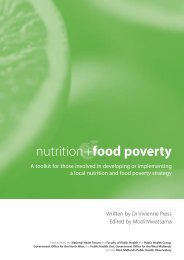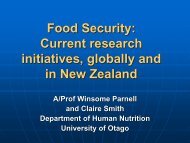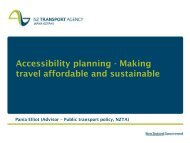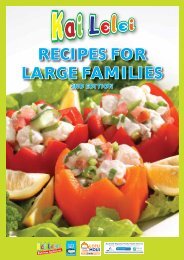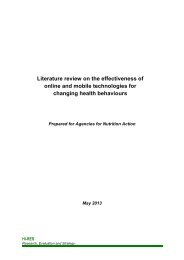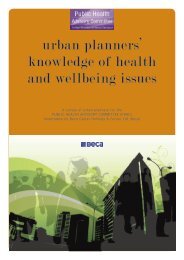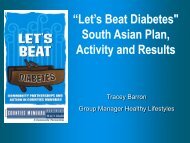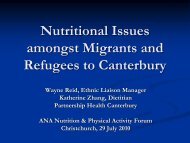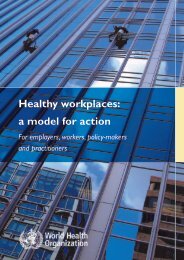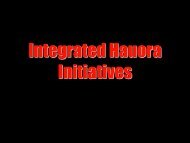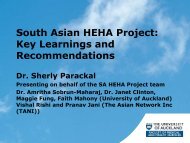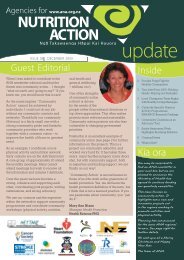enhancing food security and physical activity for maori, pacific and ...
enhancing food security and physical activity for maori, pacific and ...
enhancing food security and physical activity for maori, pacific and ...
- No tags were found...
Create successful ePaper yourself
Turn your PDF publications into a flip-book with our unique Google optimized e-Paper software.
Enhancing Food Security <strong>and</strong> Physical Activity <strong>for</strong> Māori, Pacific <strong>and</strong> Low-income PeoplesThere appear to be many nutrition <strong>and</strong> <strong>physical</strong> <strong>activity</strong> initiatives underway that could bebuilt on, including programmes run by Pacific Isl<strong>and</strong>s Heartbeat <strong>and</strong> Te Hotu ManawaMāori. A number have been identified throughout this report. In order <strong>for</strong> this to occursustainable government funding is required; capacity needs to be built to strengthen <strong>and</strong>extend such programmes; effective programmes need to be identified, either through theHealthy Eating Healthy Action evaluation or an environmental scan, particularly inrelation to <strong>food</strong> <strong>security</strong> initiatives; <strong>and</strong> robust research <strong>and</strong> evaluation needs to beundertaken of current programmes.This research has built on previous international <strong>and</strong> national research on <strong>food</strong> <strong>security</strong><strong>and</strong> <strong>physical</strong> <strong>activity</strong>. 5 It has added innovative New Zeal<strong>and</strong> research to strengthenevidence in relation to Māori, Pacific <strong>and</strong> low-income New Zeal<strong>and</strong>ers. It has taken acomprehensive approach to these challenging social issues <strong>and</strong> provided a suite ofinterventions to address them. In doing so, it has moved away from individual solutionsto complex social problems. It has also taken an environmental focus, emphasising theneed to impact on the environment in which people live their lives. 3Strengths <strong>and</strong> weaknesses of this researchA key strength of the ENHANCE research project is its mixed methods design <strong>and</strong>breadth. It has integrated two comprehensive literature reviews; focus group data;theoretical development using complexity theory <strong>and</strong> the ANGELO framework; outputsfrom workshops with relevant experts; research on specific interventions; <strong>and</strong>, feedbackon draft findings <strong>and</strong> recommendations from leaders in the <strong>food</strong> <strong>security</strong> <strong>and</strong> <strong>physical</strong><strong>activity</strong> areas. The research process has also been strengthened by its iterativeapproach. That is, each stage of the research was developed sequentially but went backto, <strong>and</strong> incorporated, the previous research findings, thus building the final researchoutcomes.Another strength is that ENHANCE had a strong equity focus. The research questionsposed by the HRC <strong>and</strong> the MoH began this process, with a focus on Māori, Pacific <strong>and</strong>low-income people. This was continued with leadership throughout the project fromMāori <strong>and</strong> Pacific researchers on the research team. Equity considerations were a majorconcern in all stages of the research including in the research design; in thedevelopment of research tools, such as interview schedules <strong>and</strong> literature review searchstrategies; in who participated in the research, such as focus groups with Māori, Pacific<strong>and</strong> low-income communities; in how the research was undertaken, such as establishingMāori (<strong>and</strong> where possible Pacific) caucuses in the phase three workshops, <strong>and</strong> in focusgroups led by Māori <strong>and</strong> Pacific researchers in their own languages, as appropriate; thedata analysis <strong>and</strong> write-up which included peer review across the project by the Māori<strong>and</strong> Pacific researchers; external peer review; <strong>and</strong> seeking feedback on draft findings<strong>and</strong> proposed recommendations from leaders in <strong>food</strong> <strong>security</strong> <strong>and</strong> <strong>physical</strong> <strong>activity</strong>based across the country, including Māori <strong>and</strong> Pacific community leaders.A third strength of this research has been the breadth of expertise in the research team.Disciplines represented include nutrition, <strong>physical</strong> <strong>activity</strong>, health economics, Māoriresearch, Pacific research, social policy, public health, clinical trials, epidemiology, <strong>and</strong>health geography. All team members have taken an active role in the entire researchprocess enabling the team to learn from each other <strong>and</strong> to construct an in-depth210



